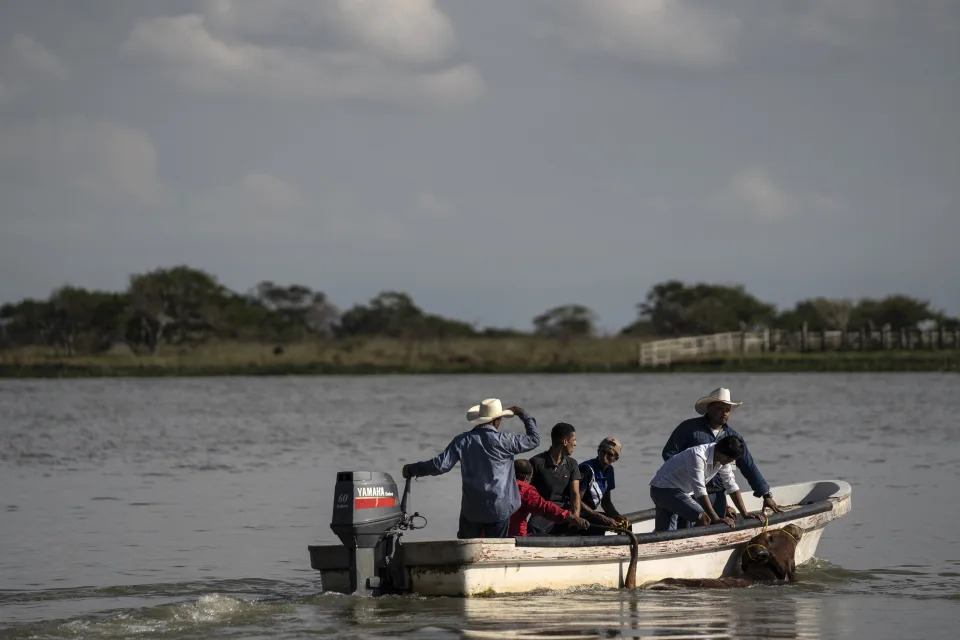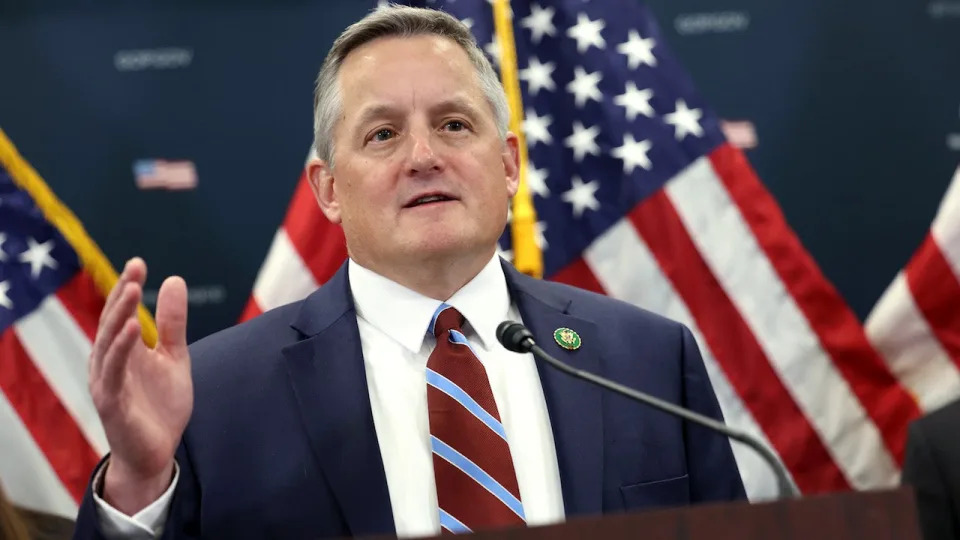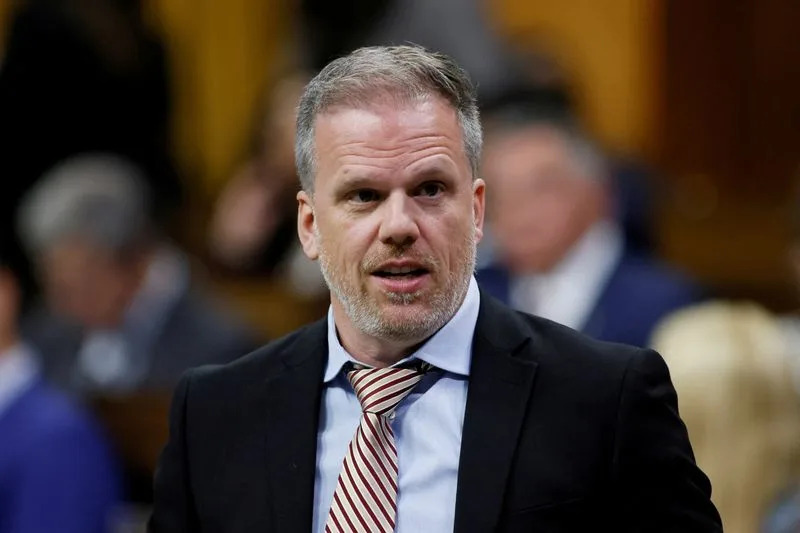Andrew R. Chow
Fri, February 2, 2024

Cheryl Shadden, a resident of Granbury, hung a sign on her street to protest the noise from a nearby bitcoin facility. Credit - Cheryl Shadden
Every night, the nurse anesthetist Cheryl Shadden lies awake in her home in Granbury, Texas, listening to a nonstop roar. “It’s like sitting on the runway of an airport where jets are taking off, one after another,” she says. “You can't even walk out on your back patio and speak to somebody five feet away and have them hear you at all.”
The noise comes from a nearby bitcoin mining operation, which set up shop at a power plant in Granbury last year. Since then, residents in the surrounding area have complained to public officials about an incessant din that they say keeps them awake, gives them migraines, and seemingly has caused wildlife to flee the region. “My citizens are suffering,” says Hood County Constable John Shirley.
Granbury is one of many towns across the U.S. feeling the negative impacts of bitcoin mining, an energy-intensive process that powers and protects the cryptocurrency. Those impacts include carbon and noise pollution, and increased costs on consumers’ utility bills. According to the New York Times, there are 34 large scale bitcoin mines across the U.S. In 2022, the crypto market tumbled, in part due to high-profile collapses of crypto companies like Sam Bankman-Fried’s FTX. But in 2023, prices rebounded once again, and mining companies decided to expand their operations in order to cash in, causing global energy consumption for mining to double, according to one study. Critics say that mining is causing both long-term environmental damage, due to its energy use, as well as local harm. “We’re at a loss here,” Granbury resident Shadden says. “We want our lives back.”
Bitcoin is so energy-intensive because it relies on a process known as proof-of-work. Rather than being overseen by a single watchdog, bitcoin is designed to disperse the responsibility of the network’s integrity to voluntary “miners” around the globe, who prevent tampering through a complex cryptographic process that consumes a vast amount of energy. Over the last few years, Texas has become a global leader in crypto mining because miners can access cheap energy and land there, as well as benefit from friendly tax laws and regulation. Bitcoin miners consume about 2,100 megawatts of the state's power supplies, and companies like Riot Platforms and Marathon Digital Holdings have recently expanded in the state. (Other states, conversely, have pushed back on the industry: In 2022, New York imposed a moratorium on bitcoin mining over concerns that miners were overusing renewable energy resources.)
More From TIME
In December, Marathon paid $178 million to purchase bitcoin mines in Kearney, Nebraska and Granbury from Generate Capital. But with the Granbury purchase, Marathon also inherited a swath of angry nearby residents across Hood County whose lives have been upended by the mining facility. Generate Capital started operating the 300-megawatt facility, which sits about an hour southwest of Fort Worth, in 2023. Initially, many residents were unaware what, exactly, was causing the noise. Shannon Wolf, who lives about 8 miles from the plant, first assumed that the rumble was coming from a nearby train. “It has woken me from a dead sleep before,” she says.
The rumble, it turned out, comes from the massive cooling fans that the facility runs to keep their computers from overheating. Data centers, like bitcoin mines, also run massive cooling fans that have drawn the ire of nearby residents.
As residents learned what had caused the din, social media platforms like NextDoor and Facebook flooded with complaints. “This sound has been driving me to the point of insanity. I have continuous migraines, I can barely get out of my head, vomiting, nosebleeds, painful knots on my scalp,” wrote one commenter. “All the birds have left, only [buzzards],” wrote another poster.
As complaints swelled, local officials brought their concerns to the site’s operator, US Bitcoin Corp. Over the summer, the company agreed to construct a 24-foot sound barrier wall on one end of the property at the cost of $1 to $2 million. But while the wall reduced sound in some areas, it actually amplified it in others. “To be honest, the complaints have gotten louder for us since the mitigation efforts,” Constable John Shirley says.
Shirley says that he is monitoring the decibel levels of the facility. Texas state law stipulates that a noise is considered unreasonable if it exceeds 85 decibels. For comparison, vacuum cleaners often run at around 75 decibels—and a cardiologist told TIME in 2018 that chronic exposure to anything over 60 decibels had the potential to do harm to the cardiovascular system. Shadden took her own readings at her house near the Bitcoin mining facility that reached 103 decibels.
But the maximum penalty for breaking that Texas law is a $500 fine, Shirley says, adding: “The state law is inadequate.” He says that he has been talking to the county attorney’s office about options for recourse. “If we have a repeated violation problem, he will be looking into potential injunctive relief,” he says.
The community’s ire boiled over at a town hall on Jan. 29, hosted by Shirley and Hood County Commissioner Nannette Samuelson. About 75 people filled the room to complain about the facility. Complaints from attendees included migraines that required trips to the emergency room and a vertigo diagnosis. One attendee said she had been forced to put her chihuahua on seizure medication. Others claimed that their windows rattled from the vibrations, and that the noise made their homes unsellable.
“How does Hood County benefit from having such a ridiculous thing?” asked one woman. “What does this community gain from having them there?”
Charlie Schumacher, the vice president of corporate communications at Marathon Digital Holdings, wrote in an email to TIME that the company was unaware of the noise issues when it purchased the site. He said Marathon was commissioning a third party to conduct a sound study as early as next week. And on Feb. 1, three days after the town hall, Marathon announced that it planned to take over full day-to-day control of the Granbury mine from its previous operators.
“Marathon deeply values our relationships with the communities in which we live and work, and we appreciate the candid input our neighbors have shared with us in recent weeks,” he wrote. "Our team will now have more influence over the sight and can hopefully have a more positive impact for the community. We are in constant touch with local officials and working with community leaders to gain more information about the situation and to work on solutions.
US Bitcoin Corp did not immediately respond to a request for comment.
While the constant noise has become a major irritant in the county, residents also worry about the facility’s impact on their power supply and the surrounding environment. Texas has a notoriously fragile grid that becomes strained in cold weather: a 2021 deep freeze caused millions of people to lose power. Wolf Hollow II, the gas plant that supplies the Granbury bitcoin mine with energy, failed during that crisis.
This year, parts of Texas were hit with a frigid arctic front in mid-January, with temperatures dropping into the teens. The state’s grid operator, ERCOT (Electric Reliability Council of Texas), asked Texans to conserve electricity. The grid mostly held up under strain, and Wolf Hollow continued to operate at full capacity, as did the mining operation.
Nevertheless, some residents in rural Hood County lost power. That included Hunter Sims, who lives a mile and a half from the plant and lost power for 9 hours, relying on a backup generator for his well. Sims was angered that he was without power while the mining operation continued unabated. Overall, he says his quality of life has worsened due to the facility’s noise pollution. “When I’m sitting in my living room, I can hear a loud humming,” he says. “You can’t really relax.”
A representative for Constellation Energy, the company that runs Wolf Hollow, said that any power outages were not a result of any issues at the plant, but rather on the local level of transmission or distribution.
Read More: Fact-Checking 8 Claims About Crypto’s Climate Impact
Erik Kojola, a senior Climate Research Specialist for Greenpeace USA, says he’s monitored similar complaints from residents near new bitcoin mining centers across the country, in Iowa, Indiana, Nebraska, and upstate New York. He also contends that bitcoin mining poses a much larger threat to the environment. “Bitcoin mining is essentially a lifeline for fossil fuels,” he says. “It's ultimately creating a new industrial scale demand for energy at a time where we need to be reducing our energy use.”
Back in Granbury, the discomfort caused by the plant is causing some consternation for a region that largely prides itself on being pro-industry and anti-regulation. “I agree with people having the right to own a business if it’s not illegal or amoral,” says Granbury resident Wolf. “But when you’re harming a group of people, there needs to be some type of remedy.”
Correction, Feb. 2, 2024
A previous version of this story misstated when the Wolf Hollow II power plant failed. It failed in 2021; it did not fail during a 2011 storm, though a separate but nearby plant, Wolf Hollow I, did.



























